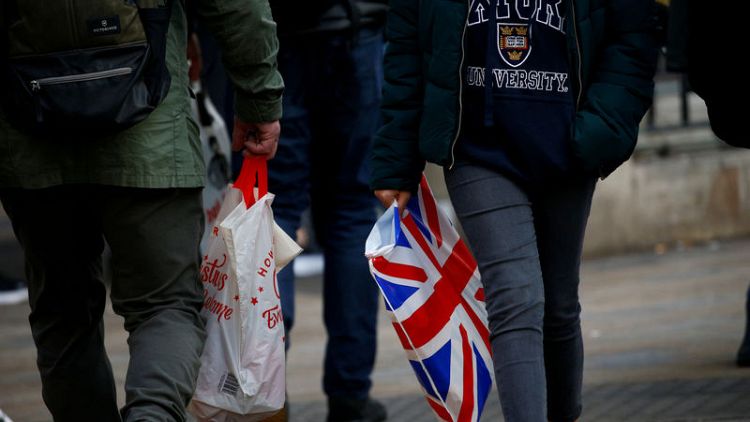LONDON (Reuters) - British consumers reined in their spending in February ahead of Brexit and shoppers focused on buying food, including for stock-piling, rather than non-essential items, data released on Tuesday showed.
The British Retail Consortium (BRC) said total sales edged up by an annual 0.5 percent, a sharp slowdown from growth of 2.2 percent in January.
Separately, Barclaycard said its broader measure of consumer spending rose by 1.2 percent, the weakest increase since the company began recording spending on its cards in 2015.
Sustained spending by Britain's consumers took the edge off a slowdown in the world's fifth-biggest economy for much of the period since the 2016 Brexit referendum although consumer confidence levels are close to five-year lows as the scheduled Brexit date of March 29 approaches.
"Uncertainty surrounding the UK’s imminent exit from the European Union has hit consumer spending," BRC Chief Executive Helen Dickinson said.
"While real incomes have started to rise over the past year, shoppers have been reluctant to spend this February, holding back growth."
On a like-for-like basis, excluding changes in the amount of store space from one year to the next, sales were down 0.1 percent, the BRC said.
Both surveys showed consumers scaling back on non-essential spending.
Barclaycard said spending in pubs and restaurants, which had been growing strongly, slowed in February.
Eighteen percent of respondents in a poll it conducted had begun stockpiling food and essential household supplies in case of shortages after Brexit.
"Uncertainty over Brexit appears to be driving a shift in behaviour, with many Brits worrying about price rises and cutting back on non-essential spend, and some even stockpiling everyday items," Esme Harwood, director at Barclaycard, said.
Barclaycard's spending figures were based on credit and debit card spending between Jan. 20 and Feb. 16. The BRC data cover Jan. 27 to Feb. 23.
On Feb. 26, Prime Minister Theresa May opened the way for a possible delay to Brexit.
Employee-owned John Lewis is the only major British retailer to update on weekly sales, providing the most up to date snapshot of consumer behaviour. Sales at its department stores fell 3.9 percent in the four weeks to Feb. 23.
(Reporting by William Schomberg and James Davey; editing by Kate Holton)



